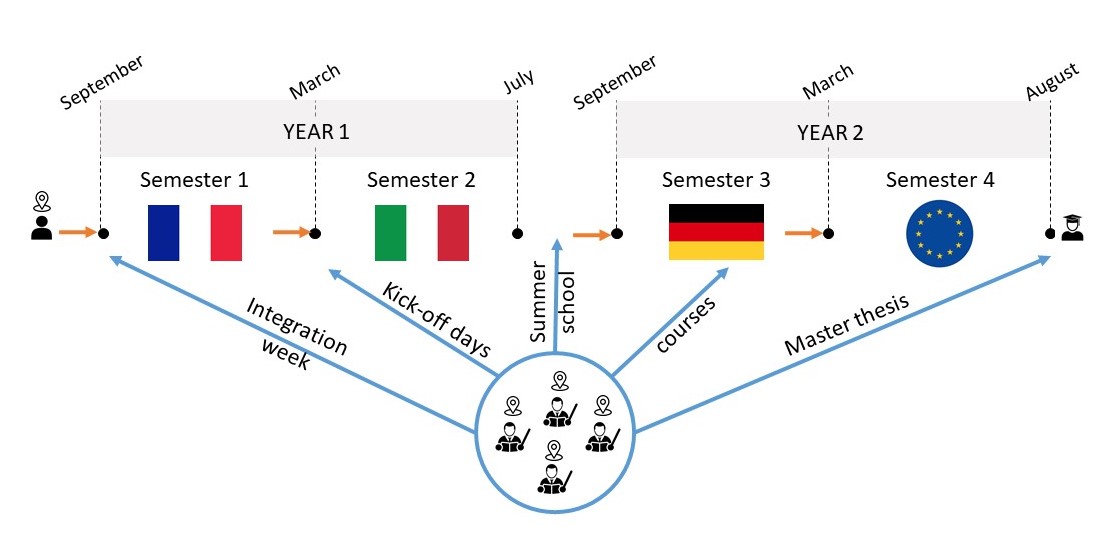ERASMUS MUNDUS JOINT MASTER : Membiomed
Overview
The International MemBioMed Master's (from Membrane Biology to Neuroscience and Experimental Medicine) is designed to provide a high-quality, fully integrated qualification, with a unique focus on multidisciplinary research on biomembranes. This 2-year Master's programme is delivered jointly by a consortium of 3 European Higher Education Institutions (Université Côte d'Azur, University of Genoa and University of Osnabrück), supported by leading research centers equipped with state-of-the-art technologies (IPMC-CNRS, NSYNC-IIT, CellNanOs) and a wide network of associated partners (academic institutions, pharmaceutical and biotech companies, hospitals).
The MemBioMed programme will train future leaders in the field of cell membranes for biomedicine, neuroscience and nanotechnology. The programme’s content reflects the latest scientific advances on biomembranes, offering stimulating research opportunities with collaborative projects and partnerships with industry, proposing workshops and thematic schools focusing on current issues and new technologies, and engaging in effective communication and networking.
Excellent international students will be selected through a fair and transparent process. They will spend the first semester in France, the second semester in Italy, the third semester in Germany and their Master thesis in any of the universities or associated partners. Two additional internships in the first year will complete the training preparing a future generation of scientists, entrepreneurs and executives to play a leading role in studying the complex behaviour of cell membranes and exploiting their full therapeutic potential.
Figure 1 : Overall programme and mobilities
Consortium
The MemBioMed project is driven by the ambition of three universities, renowned worldwide for offering high-quality local master’s degrees in biology, to create a joint master’s degree in biomembranes, providing added value of international mobility, academic excellence, complementarity and innovation.
The MemBioMed consortium partners are:
- Université Côte d’Azur (UniCA, France), coordinator and beneficiary
- University of Genoa (UniGe, Italy), full partner
- Osnabrück University (UOS, Germany), full partner



Objectives

Figure 2 : Expertise and complementarity of the consortium
The master programme will provide its trainees with a rounded education that will significantly enhance their career perspectives in the academic or private sector by enabling them to meet future challenges in a variety of specialized fields, from drug development and nanomedicine to membrane engineering and neurophysiology.
This will be achieved by realizing the following objectives:
- to build a unique and fully integrated training programme executed by a consortium of three HEIs with complementary excellence in biomembrane research and higher education;
- to provide students with combined theoretical knowledge in biomembrane-related cell biology, structural biology, pharmacology, neurophysiology, biophysics, biochemistry and bioinformatics;
- to recruit the best students from all over the world, providing them with funded physical mobilities and access to the world-class scientists in the field of biomembranes;
- to promote, structure and sustain collaborations among the partner universities through the organization of joint training events and the exchange of students and staff;
- to promote innovative biomembrane research at the interface of different disciplines and enhance the visibility and attractiveness of the partner universities, associated laboratories and industry in this field;
- to train a next generation of scientists with state-of-the-art knowledge for studying cellular membranes across multiple scales and disciplines, from monitoring the complex interactions among protein and lipid components at highest resolution to how their collective properties influence biological processes at the level of cells, tissues and organisms in health and disease;
- to produce well-rounded student profiles with practical work and project-oriented formation for the development of innovative downstream applications;
- to increase the employability of students in the pharmaceutical and biotechnology industries by providing them with hard and soft skills associated with entrepreneurship and industrial networks;
- to provide a valuable specialized workforce in line with unmet academic and industrial demands in clinical pharmacology, experimental medicine, neuroscience and nanotechnology;
- to improve the quality of the European Higher Education Area by intensifying academic cooperation and internationalization among MemBioMed’s participating HEI’s.


